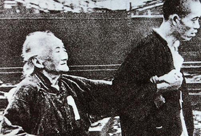 Martenitsa adds glamour to Bulgarian Embassy
Martenitsa adds glamour to Bulgarian Embassy
 Mysterious 'Dolan Tribe' in Xinjiang
Mysterious 'Dolan Tribe' in Xinjiang
 This is Shanghai
This is Shanghai
 Female attendants serving 'two sessions'
Female attendants serving 'two sessions'
 The many tears of DiCaprio
The many tears of DiCaprio
 Dan Dan's bittersweet opera life
Dan Dan's bittersweet opera life
 A dream wedding for a girl suffering from cancer
A dream wedding for a girl suffering from cancer
 Old photos of Anti-Japanese War (1937-1945)
Old photos of Anti-Japanese War (1937-1945)
 This is Beijing – Nanluoguxiang
This is Beijing – Nanluoguxiang
BEIJING, March 10 -- A sense of achievement swept over Wang Donglin when his ideas on anti-terrorism education won support from his fellow political advisors in China.
Wang's "aha moment" came as he browsed his online networks and found his friends and acquaintance talking about ways to survive a terrorist attack. The discussion came only hours after Kunming bloodbath and lasted for days.
He is not the only member of the Chinese People's Political Consultative Conference (CPPCC) National Committee or deputy to the National People's Congress (NPC) who samples public opinion on mobile Internet. Of this year's deputies and members, 203 have real-name accounts on Chinese microblogging websites.
The ongoing Second Session of the 12th NPC and the Second Session of the 12th CPPCC National Committee have set up public WeChat accounts to forward latest news and service information to the general public.
The mobile Internet has found its way in Chinese people's political life.
TWO SESSIONS ON MOBILE
By the end of 2013, China had 1.24 billion mobile phone users. Weibo and WeChat users both exceeded 500 million.
Fast development of the mobile Internet has changed the form of information dissemination. Instant communication among all classes is possible any time and anywhere.
NPC deputies and CPPCC National Committee members have full-time jobs apart from participating in political affairs. It is impossible for them to follow every important topic.
"Public opinion overwhelms me on the Internet," said Wang Donglin.
Wang divided his family and friends into six chat groups on WeChat according to their area of expertise. His Weibo account has more than 70,000 followers. Weibo and WeChat are two major ways for him to learn what ordinary people want from the government.
There are many people like Wang Donglin using new media to promote social reform.
Two years ago, the president of 3G Portal Zhang Xiangdong initiated an opinion poll on Weibo and received 1.2 billion Internet users' support for abolishing the crime of prostituting girls under the age of 14, and reclassifying the crime as rape.
On a Weibo account that posts the latest breaking news worldwide, remarks made by head of the regional government of Xinjiang on terrorism received more than 500 "likes" within an hour.
Shao Zhiqing, an NPC deputy and deputy director of Shanghai Municipal Commission of Economy and Informatization, said the legislature had turned from "close-door" to "open-door" legislation, meaning legal drafts are open to public suggestions and critique before becoming final.
"Now laws and regulations balance interests of all parties, and better realize social justice," said Shao.
Online public opinion can affect public policy. The government of the southwest city of Guiyang held an online forum with its residents last year on ways to get rid of traffic jams, and formed a traffic management plan including building a light railway, and bus rapid transit system to ease traffic pressure.

 Chaihe village, pure and peaceful fairyland in snow
Chaihe village, pure and peaceful fairyland in snow Belgians warmly welcome arrival of China's giant pandas
Belgians warmly welcome arrival of China's giant pandas Female marines receive tactical training in NW China
Female marines receive tactical training in NW China Blood memory: Nanjing Massacre in 1937
Blood memory: Nanjing Massacre in 1937 Top 10 pure beauties in showbiz
Top 10 pure beauties in showbiz British WWII veteran: I can't forgive Japan
British WWII veteran: I can't forgive Japan Tongban's dream of prosperity
Tongban's dream of prosperity Chinese frigate Yancheng holds drills in Mediterranean Sea
Chinese frigate Yancheng holds drills in Mediterranean Sea A visit to comfort woman's home in South Korea
A visit to comfort woman's home in South Korea Fairyland? Qingdao in sea of clouds
Fairyland? Qingdao in sea of clouds Top 10 most handsome faces in Asia in 2013
Top 10 most handsome faces in Asia in 2013 Female celebs with beautiful long legs
Female celebs with beautiful long legs Cat 'guardians' in Forbidden City
Cat 'guardians' in Forbidden City Large numbers of ancient coins excavated in Inner Mongolia
Large numbers of ancient coins excavated in Inner Mongolia Leisurely life beneath Zhonggulou, where time travels slower
Leisurely life beneath Zhonggulou, where time travels slowerDay|Week|Month